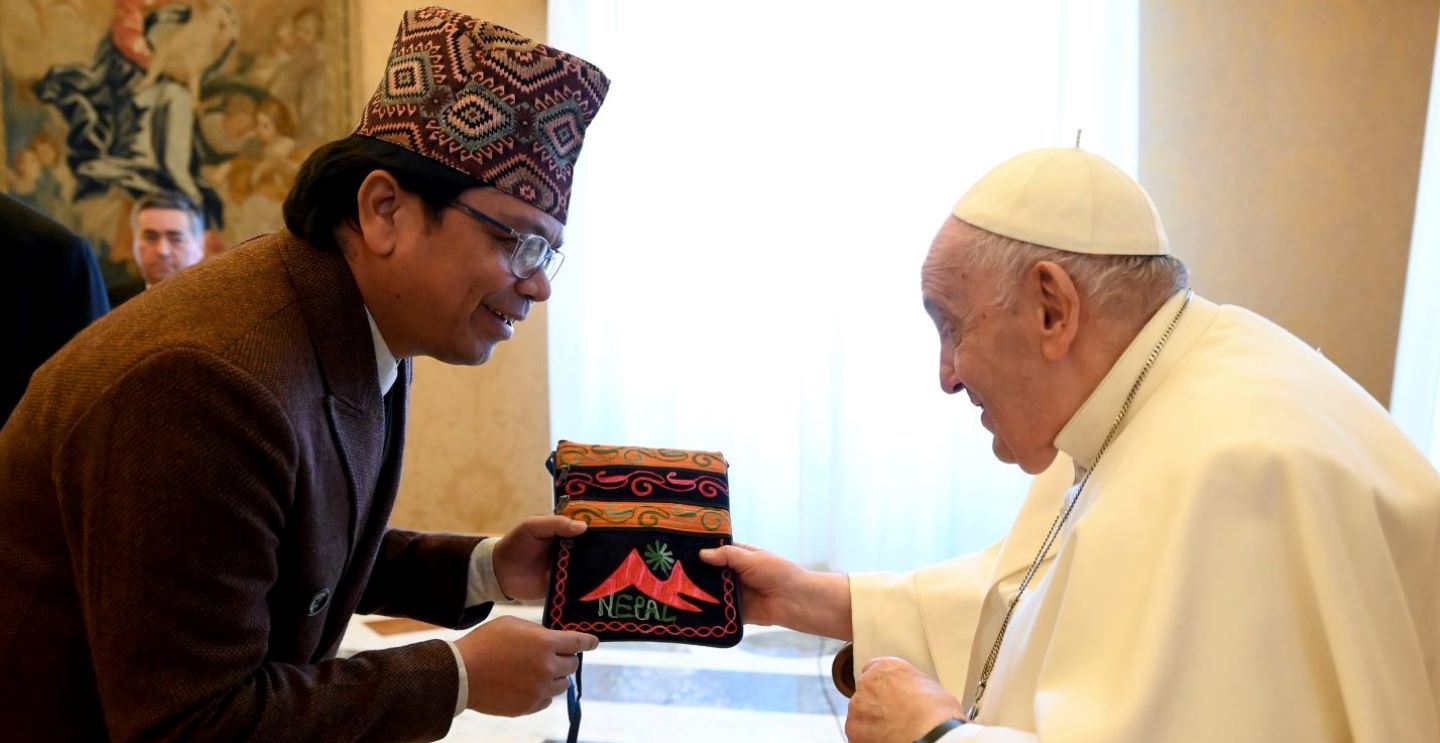Pope Francis receives indigenous leaders who call for climate justice
IFAD Asset Request Portlet
ناشر الأصول
Pope Francis receives indigenous leaders who call for climate justice
10 فبراير 2023 |
| © VATICAN NEWS |
Vatican City, 10 February 2023. Meeting with Pope Francis today, 40 indigenous leaders raised their concerns about the toll that extractive and exploitive industries fuelling the global economy were having on growing inequality, preventing access to basic human rights and hindering environmental sustainability.
The indigenous leaders, who were in Rome to attend the 6th Global Meeting of the Indigenous Peoples’ Forum hosted by the International Fund for Agricultural Development (IFAD), hand delivered their message during a private audience with His Holiness, Pope Francis.
“The dangers facing our world have not only persisted since our last encounter in 2019 but have grown even more dire in many respects. Human beings continue to destroy nature, pollute our waters, and ignite our jungles and forests,” said the indigenous leaders in their message.
The scramble for natural resources in areas where they live, including timber-rich rainforests and mineral-rich mining areas continues to see encroachments on Indigenous Peoples’ lands and territories by extractive industries. The lack of effective support and protection often leads to a variety of incidence of intimidation, extreme violence and even assassination. In 2020, over one-third of the 227 climate and environmental activists murdered globally came from indigenous communities; almost three out of four murders took place in Latin America.
IFAD President Alvaro Lario, also in attendance, emphasized the role of Indigenous Peoples as climate leaders who are essential to protect biodiversity and ensure a viable future on Earth for future generations.
“No one, no agronomist or development professional will ever understand nature as deeply as the Indigenous Peoples. Nurtured over millennia, their knowledge of the Earth’s plant and animal life remains unrivalled,” said Lario.
More than 476 million people from 90 countries define themselves as Indigenous Peoples. And while they represent roughly 6 per cent of the world’s population, they account for 18 per cent of the world’s poorest people. Seven out of 10 are native to the Asia and Pacific region. Indigenous Peoples help preserve a significant portion of the world’s biodiversity extending across one-quarter of the globe's surface.
“Indigenous Peoples are displaying tremendous resilience and creativity as climate leaders and stewards of nature. They are crafting practices and applying unique approaches that are invaluable in confronting the climate crisis,” added Lario.
Despite their traditional knowledge, the climate crisis is seriously threatening their livelihoods. Farming, pastoralism, shifting cultivation, rotational agriculture, fishing, and hunting and gathering are all dependant on a predictable climate. Indigenous Peoples are particularly vulnerable to the effects of the climate crisis due to their close relationship with the environment.
Communities continue to defend their rights, as reflected in the UN Declaration on the Rights of Indigenous Peoples, and seek spaces for effective collaboration and advocacy in national and international fora such as this week’s forum at IFAD, while they fight for a place in the global climate debate, and be part of decisions that affect them.
Meanwhile, the right to free, prior and informed consent (FPIC), including the right of Indigenous Peoples to participate in any decision-making processes that affects them, continues to be overlooked by many, due to a lack of awareness, understanding and recognition of their perspectives, actions and governance systems.
Note to editors:
IFAD, championing indigenous peoples
The 6th Global Meeting of the Indigenous Peoples’ Forum at the UN’s International Fund for Agricultural Development (IFAD) congregates over 100 Indigenous Peoples’ representatives and observers from all over the world. The Forum is a platform for meaningful dialogue in which Indigenous Peoples’ representatives convey their concerns, requests and recommendations to improve the partnership with IFAD towards sustainable rural transformation. The outcome of the Forum will be presented by representatives of the Indigenous Peoples to the IFAD Governing Council, the following week.
IFAD Indigenous Peoples Awards recognize the efforts and achievements of development projects that successfully engage with Indigenous Peoples living in rural areas.
IFAD has updated its Policy on Engagement with Indigenous Peoples last December, recognizing Indigenous Peoples as horizontal partners and a priority for IFAD. As the sole international financial institution to include commitments and targets on Indigenous Peoples in its corporate documents, IFAD is committed to continue advocating for their essential role to preserve biodiversity thanks to their ancestral knowledge and stewardship.
Since 2010, almost one-third of IFAD’s lending programme has supported development initiatives with Indigenous Peoples. A total of 83 IFAD-funded projects have reached about nine million Indigenous Peoples in 46 countries. IFAD investment in these projects is estimated to be around US$1 billion, leveraging around US$2 billion in co-financing.
PR N.: IFAD/07/2023
IFAD is an international financial institution and a United Nations specialized agency. Based in Rome – the United Nations food and agriculture hub – IFAD invests in rural people, empowering them to reduce poverty, increase food security, improve nutrition and strengthen resilience. Since 1978, we have provided more than US$24 billion in grants and low-interest loans to fund projects in developing countries.
A wide range of photographs and broadcast-quality video content of IFAD’s work in rural communities are available for download from our Image Bank.
